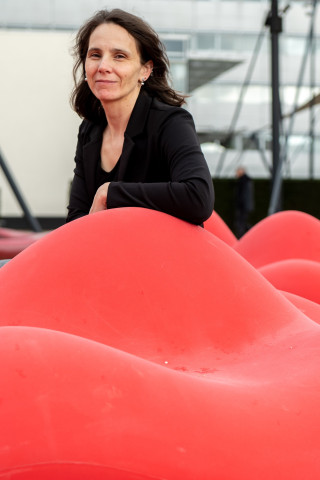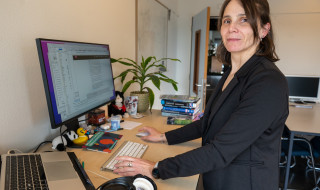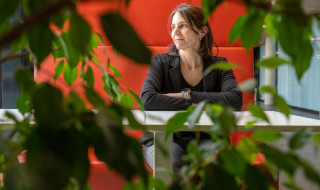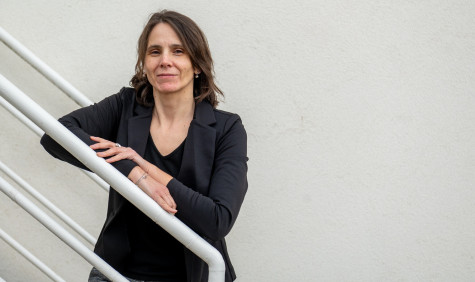"Science is in my DNA"
WTR member Ana Varbanescu: changing the world one step at a time
As a new member of the Scientific Technical Council (WTR), Ana Varbanescu looks back on her move from Romania to the Netherlands. Now fully settled in, Ana is working diligently to create a better world for future generations.
Slippery snakes
“My first computer was an aMIC, a Romanian-made microcomputer based on models from the Eastern Bloc. Then I got an HC-85, a clone of the ZX Spectrum. They were very limited machines, but I enjoyed programming them. That I could make things happen in a virtual world really fascinated me, like the version of the famous ‘Slippery’ snake game I wrote in BASIC with my father. Because I was pretty good at math and technical subjects at school, programming felt like second nature to me. It's more concrete than math but still just as precise. As I got older, I became interested in how computers are built. For one of the courses I would later teach, I designed an assignment for my students to build and program a small computer system to remotely control a toy car. That was fascinating to do. I saw my own fascination reflected in the students’ enjoyment.
While studying Computer Science in Romania, I met some interesting people, all with different perspectives, such as Professor Nicolae Tapus and Irina Athanasiu. They were very different characters, but each was inspiring in their approach. This is precisely why I find academia so fascinating: because of the somewhat eccentric people who go out of their way to pursue their exciting ideas. And let’s not forget that my father is a professor, so science is in my DNA.
Going Dutch
I was supposed to do my bachelor’s thesis at TU Delft. Unfortunately, my visa was not processed in time because – allegedly – there was some ‘suspicious activity’ at the embassy. So, I had to work on my thesis in Romania. When I finally got my visa, it was already summer. What should have been a study visit turned into a three-month ‘research visit’ to the Netherlands, where everyone was on vacation at the time. Fortunately, a colleague and I were very hospitably received by Prof. Sorin Cotofana at TU Delft and we were given a small research topic. We spent many days on campus, but were also able to enjoy the Netherlands. I loved it here.
With the help of an Erasmus scholarship, I returned for a master’s thesis at TU Delft. That succeeded, but once I graduated, I still decided to go back to Romania. I started a part-time PhD and worked part-time as a teacher, with the plan to solve all the problems in the Romanian higher education system. At least, that is what I hoped.

Since I was teaching 40 hours a week, I was soon drowning in work. Officially, I was still a part-time doctoral student, but in reality I simply did not have time for research. As it happened, ‘changing the world’ became a full-time job. After a few years, I began to feel stuck; I was no longer moving forward in any way. I could not make a difference in Romania and felt that I needed to improve myself and gain more knowledge before I could really start changing the world. On 1 January 2004, I found a vacancy for a PhD at TU Delft in my mail. On a whim, I applied that same day.
I was hired and began my PhD in Delft in September of that year. It was not difficult to adjust to the Dutch culture. Of course, there were some differences with my native country. In Romania, it’s all about the right connections; that’s the only way to get anything done. If people like you, they will move mountains to help you. But if they don’t like you, nothing happens. The Dutch rely more on procedures than on personal relationships. Take the post office. In Romania, you stand in line, talk to an employee and hope that they will eventually give you the correct postage or form. In the Netherlands, you get a number and wait your turn. You don’t have to befriend the post office employee to get help.
What particularly appeals to me in the Netherlands is the attention to personal interests and well-being. Dutch people spend a lot of time on their own development and strive for the right balance between work and leisure. In contrast, when I look at Romanian society, it does not cheer me up. My country is shifting toward the American model, with growing tensions and a widening gap between rich and poor. This causes resentment. It leads to a broken society and extensive corruption. We are a democracy. People vote. There is a functioning political system and a functioning country, but there is still a long way to go to figure out how to deal with the new reality. It is a frustrating, slow process.
Complex challenge
Currently, I am working at the University of Twente. I am also a guest at the University of Amsterdam for about one day a week because I have a few more PhD students there. At Twente, the field is broader and based on large-scale distributed systems, the so-called ‘computing continuum.’ I now chair a group called Computer Architecture for Embedded Systems, but my research focuses more on architecture than on the ‘embedded’ side. I prefer to call myself a ‘performance engineer’ and focus on the performance and energy efficiency models of computer systems. The goal is to model systems and applications so that I can make predictions about their non-functional behaviour.
"My message is: I make sure all our computers produce as little waste as possible"
To people unfamiliar with IT, I used to say, ‘I make sure your applications run faster.’ Recently, my work has shifted more to energy efficiency and sustainability. Now my message is, ‘I make sure all our computers produce as little waste as possible.’
The need for digital services continues to grow, and we are constantly thinking about the next generation of supercomputers. At the same time, we are facing skyrocketing energy bills. It is a highly complex challenge to make a country, region and continent sustainable in terms of IT. This is being extensively debated. The European Union has its own story - the European Green Deal - and so do the national government, the various sustainability coalitions and institutions such as TNO. Everyone looks at the issue from different perspectives and angles.
Raising awareness
Above all, I believe that every little bit helps. The first step is awareness. People don’t realise what happens when they use their phones, are online or fall asleep with Netflix on. All of these things consume energy. It’s not just the power consumption of the TV, but also the streaming of data throughout the network system so that the TV can broadcast it. There is still much to educate about how we can reduce our footprint. And that starts with computer scientists like me. With tools, statistics, and labels, we can raise awareness in a way that everyone understands.

"In Romania, it’s all about the right connections; that’s the only way to get anything done. If people like you, they will move mountains to help you. But if they don’t like you, nothing happens. The Dutch rely more on procedures."
This is not just about cost. You can move a data center to Iceland because energy is cheaper there, but that doesn’t mean you suddenly use less energy. Nor does it mean you can waste more because it’s cheaper. Every little step counts, because energy is a common and limited resource.
"Computer scientists and digital service providers owe it to our society to be transparent about energy wasted by IT"
Education is also needed in the research community. Not only among supercomputer users, but also among programmers, for example. For them, it doesn’t matter that their code runs twenty times slower. For us, it does matter because twenty times slower means twenty times more energy wasted. We lack the methods, tools and benchmarks to make this waste visible and concrete. And ways to make that code less wasteful. ‘Transparency’ is the word TNO likes to use for this; we need more transparency about the waste in IT. We lack numbers, and even if we had the numbers, how do you relate them to everyday life, our work and our productivity? Computer scientists and digital service providers owe it to our society to say, ‘Okay, here are the numbers and these are the consequences.’ Only then can we make informed choices. That’s why we need to invest in transparency. Hopefully, someone can figure out how to do this because I’m not a sociologist.
The bigger picture
So far, I have a pretty good career, and I am happy to work with many students worldwide. They know me for what I do and who I am. I get invited to conferences and meet people who ask for my opinion. Despite my migration background, I have managed to be part of the Dutch academic world. I am happy about that, and I hope the group I took over just over a year ago continues contributing to relevant international research.

"There is still much to do, but I meet many young people who want to change the world with me. I hope they will always continue to inspire me.”
Looking at the bigger picture, I think digitalisation will continue. In the constant stream of new digital services, we must figure out how to deal with sustainability. That has to be our priority. Building a fair and better digital world is quite difficult, but we are moving in the right direction. In the EU, we fortunately have the specialists, the money and the infrastructure to work on a digital society that changes the world for the better. There is still much to do, but I meet many young people who want to change the world with me. I hope they will always continue to inspire me.”
What is the WTR?
The Scientific Technical Council (WTR) is an independent advisory body. The council advises SURF and its members, solicited and unsolicited, on strategic, scientific and technical issues of the cooperative.
Earlier this year, Ana Varbanescu succeeded Professor Henk Sips (her supervisor) as a member of the WTR. “An outside opinion is very useful and meaningful. It is interesting to see from the outside how the processes within an organisation work. Recently, we evaluated the SURF strategy. From that evaluation follow the recommendations and general advice of the WTR. SURF may ignore this advice or use it as they see fit, but towards the members, it is stronger if the WTR supports SURF’s story.”
Text: Edwin Ammerlaan
Photos: Sicco van Grieken
